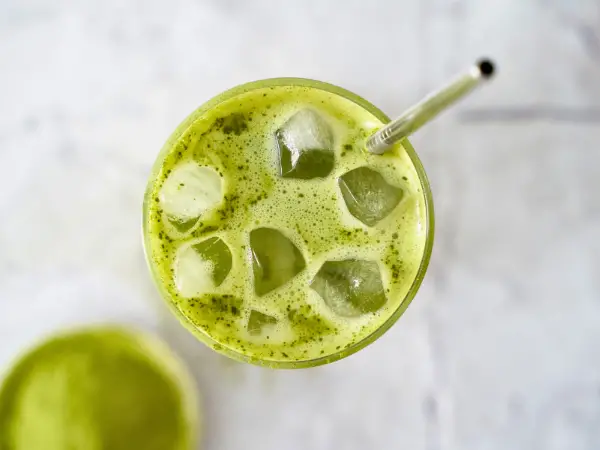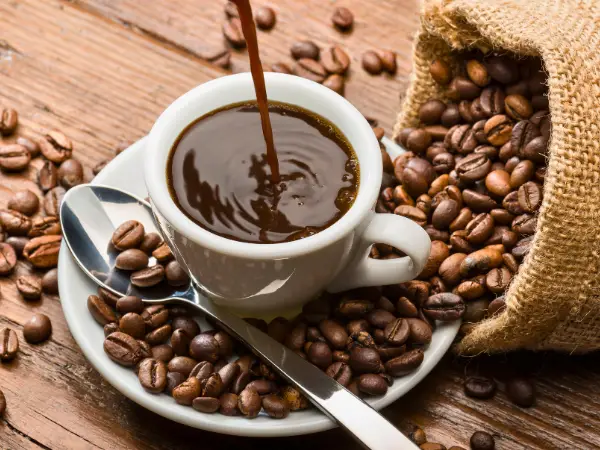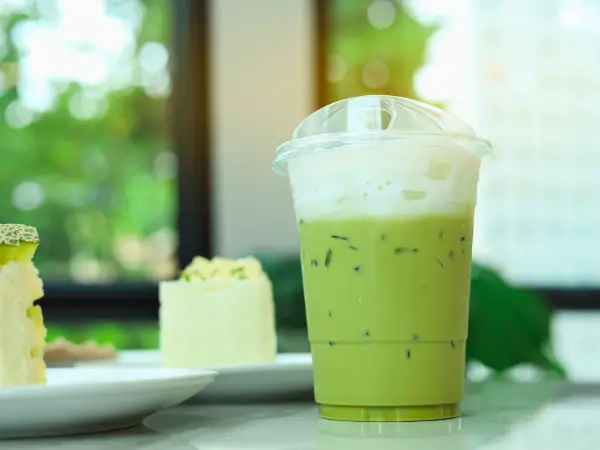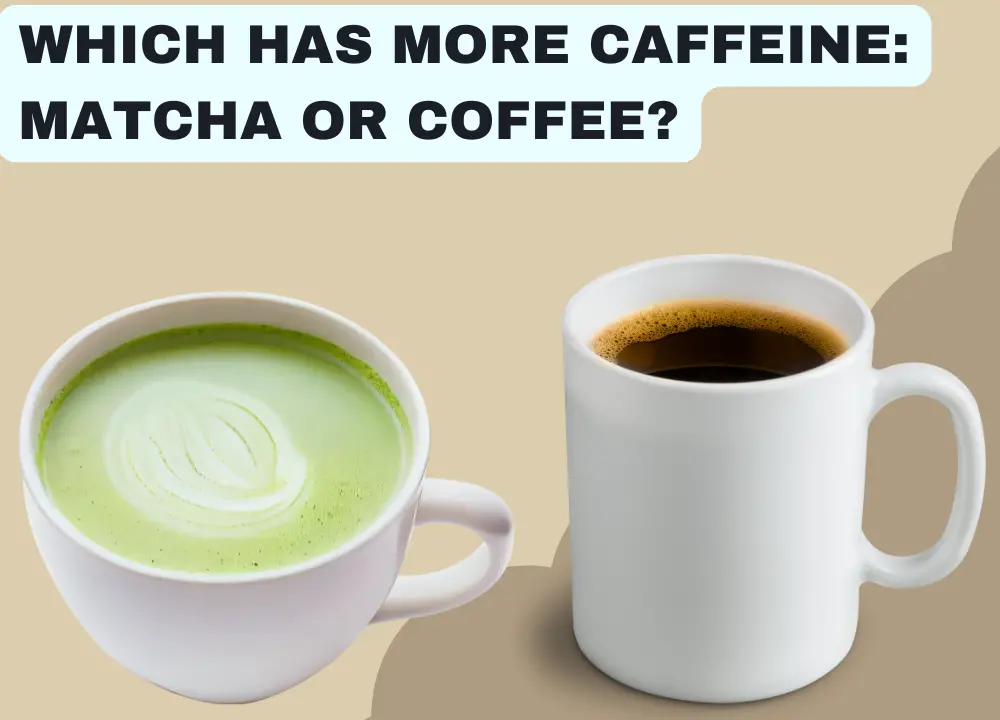This comparison will guide you through the caffeine levels in matcha and coffee. You’ll discover how each drink affects your body and energy levels. Understanding the caffeine content in these two beverages can help you make better choices.
Caffeine Content: Matcha Vs. Coffee – A Direct Comparison
Both matcha and coffee are popular choices for a caffeine boost. This section explores the caffeine levels in matcha and coffee. We will break down the differences between these two beverages.
Average Caffeine Levels In Matcha (per Serving)
Matcha is a special type of green tea made from powdered leaves. Generally, the average caffeine levels in matcha are between 30-70 mg per serving. A typical serving is about 1 teaspoon of powder.
Here are some key points about matcha caffeine:
- Higher quality matcha often has more caffeine.
- Matcha provides a steady energy release.
- It contains L-theanine, which can reduce jitters.
To give a clearer picture, here’s a simple table comparing matcha caffeine levels:
| Type of Matcha | Caffeine Content (mg) |
|---|---|
| Standard Quality | 30-50 |
| High Quality | 50-70 |
In summary, matcha offers a moderate amount of caffeine. It is a great choice for those who enjoy a smooth energy boost.
Average Caffeine Levels In Coffee (Per Cup)
Coffee is one of the most popular beverages worldwide. It is loved for its rich flavor and energizing effects. The average caffeine levels in coffee are significantly higher than matcha. A standard 8 oz cup contains about 95-120 mg of caffeine.
Here are some important facts about coffee caffeine:
- The brewing method can affect caffeine levels.
- Espresso has a higher caffeine concentration per ounce.
- Dark roast coffee usually has slightly less caffeine than light roast.
Check out this table for a better understanding of coffee caffeine levels:
| Coffee Type | Caffeine Content (mg) |
|---|---|
| Regular Brewed | 95-120 |
| Espresso (1 oz) | 63 |
Thus, coffee provides a strong caffeine punch. It is ideal for those needing a quick energy boost.

Comparing Raw Caffeine Content (grams/dry Weight)
When comparing matcha and coffee, looking at raw caffeine content is helpful. Matcha and coffee differ in their caffeine concentration. Matcha contains about 2-4% caffeine by dry weight. In contrast, coffee contains about 1-2% caffeine by dry weight.
This means that matcha may have slightly more caffeine relative to its weight. However, the actual serving size matters. Here are some points to consider:
- Matcha is consumed in powdered form, increasing caffeine intake.
- Coffee is brewed, extracting caffeine into the liquid.
- The preparation method can influence caffeine extraction.
Here’s a brief comparison table:
| Beverage | Caffeine Content (% by Dry Weight) |
|---|---|
| Matcha | 2-4% |
| Coffee | 1-2% |
Understanding these factors helps clarify caffeine levels in both beverages. This knowledge can assist in choosing the right drink for your needs.
Understanding Matcha’s Caffeine: The L-theanine Factor
Matcha offers a unique caffeine experience due to its special components. One key is L-theanine. It works with caffeine to create a different type of energy boost.
L-theanine’s Role In Modulating Caffeine Effects
L-theanine is an amino acid found in matcha. It plays a significant role in how caffeine affects the body. Unlike coffee, which can lead to spikes in energy, matcha’s L-theanine helps smooth the caffeine boost. This reduces jitters and promotes a more balanced experience. Here’s how L-theanine works:
- Enhances relaxation without drowsiness.
- Improves cognitive function and focus.
- Reduces stress and anxiety levels.
Studies show that L-theanine can alter brain waves. It increases alpha waves, which are linked to relaxation. This effect can lead to a calm state while still being alert. In contrast, coffee often leads to a sudden energy burst. This can cause crashes later. The table below shows a comparison:
| Drink | Caffeine Content (per 8 oz) | L-Theanine Presence |
|---|---|---|
| Coffee | 95 mg | None |
| Matcha | 70 mg | Yes |
In summary, L-theanine in matcha helps balance caffeine’s effects. This combination leads to a smoother experience compared to coffee.
Sustained Energy Vs. Caffeine Jitters
Many people enjoy coffee for a quick boost. However, this often leads to caffeine jitters. These jitters can cause feelings of anxiety or nervousness.
Consider these points:
- Matcha provides a gradual caffeine release.
- Coffee often causes sudden energy highs.
- Jitters can distract and reduce productivity.
People who prefer matcha report feeling more focused and calm. They enjoy prolonged energy without the crash. This makes matcha an excellent choice for studying or working.

The Calm Alertness Of Matcha
Matcha’s unique combination of caffeine and L-theanine promotes focus and calmness. Unlike coffee’s rapid high, matcha creates a state of calm alertness.
Here are the benefits of matcha’s calm alertness:
- Improved focus during tasks.
- Less anxiety compared to coffee.
- Better mental clarity and creativity.
The calming effect from L-theanine balances caffeine’s stimulating properties. It helps users stay calm, even during challenging tasks.
Coffee’s Caffeine: Rapid Release And Effects
This section focuses on coffee’s caffeine and its rapid effects. Coffee causes a fast energy spike and a quick crash.
The Quick Caffeine Spike And Crash
Coffee is known for its quick caffeine release. When you drink coffee, caffeine enters your bloodstream quickly. This leads to a rapid energy boost.
However, this energy spike is often followed by a crash. The effects of caffeine wear off, leaving you feeling tired. This cycle can be frustrating for many coffee drinkers. Here are some common experiences:
- Initial boost in energy and focus
- Increased heart rate
- Followed by fatigue or lethargy
The table below shows the typical timeline of caffeine effects from coffee:
| Time After Consumption | Effect |
|---|---|
| 0-30 minutes | Energy spike, increased alertness |
| 1-2 hours | Peak caffeine effect |
| 3-4 hours | Energy levels begin to drop |
| 5-6 hours | Potential crash in energy |
This quick caffeine spike and crash can impact your daily routine. Many people rely on coffee for instant energy, but understanding these effects is crucial.
Potential Side Effects Of Coffee’s Caffeine
While coffee offers a quick energy boost, it can also have side effects. Some people experience jitters after drinking coffee. This can lead to feelings of anxiety or nervousness.
Here are some potential side effects:
- Jitters – anxiety and sleep issues for some
- Increased heart rate
- Headaches or migraines
- Digestive issues
Many factors can influence how coffee affects you. The amount of coffee consumed and your individual tolerance play significant roles.

Factors Affecting Coffee’s Caffeine Potency
Coffee’s caffeine potency can vary based on several factors. Brewing method is one of the most significant. Different methods extract caffeine at different rates.
Other factors include:
- Grind Size: Finer grounds increase caffeine extraction.
- Water Temperature: Hotter water extracts more caffeine.
- Brewing Time: Longer brewing times lead to higher caffeine levels.
Understanding these factors can help you control your caffeine intake. Adjusting your brewing method or grind size can enhance or reduce caffeine levels.
Serving Sizes And Preparation: Impact On Caffeine Intake
Serving sizes and preparation methods play a key role in how much caffeine you consume.
Matcha Serving Sizes And Preparation Methods
The caffeine content in matcha varies by the amount of powder used. A typical serving size is about 1 teaspoon of matcha powder, which contains approximately 30-70 mg of caffeine.
Preparation methods can also affect the caffeine level. Here are common ways to prepare matcha:
- Traditional Whisking: Mix matcha powder with hot water using a bamboo whisk.
- Matcha Latte: Combine matcha with steamed milk or milk alternatives.
- Cold Brew Matcha: Mix matcha with cold water and ice for a refreshing drink.
Each method can slightly alter the caffeine concentration based on how well the powder dissolves. The quality of the matcha also impacts its caffeine content.
Coffee Serving Sizes And Brewing Techniques
Coffee is a favorite drink for many. The caffeine content in coffee varies greatly by serving size and brewing technique. A standard cup of coffee is 8 oz but the caffeine content can differ based on the brew type.
| Brew Type | Caffeine Content (mg) |
|---|---|
| Drip Coffee | 95-200 |
| Espresso | 63 (per 1 oz) |
| French Press | 80-100 |
Espresso is more concentrated, which leads to higher caffeine content per ounce. Brewing method matters. For example, longer brew times extract more caffeine.
How Preparation Influences Caffeine Levels
Using 1 teaspoon provides 30-70 mg of caffeine. With coffee, the brewing method is crucial. A standard 8 oz cup can vary by brew type and can range from 95 to 200 mg of caffeine.
Here are key points to consider:
- Matcha: More powder means more caffeine. Traditional preparation releases caffeine differently than lattes.
- Coffee: Espresso packs more caffeine into a smaller serving. Brew time and grind size also matter.
Understanding these factors helps you choose between matcha and coffee. Both drinks offer unique flavors and caffeine experiences. Your preparation choice can either enhance or reduce your caffeine intake.
Health Benefits Beyond Caffeine: Matcha Vs. Coffee
Both drinks have unique health benefits beyond just caffeine. Matcha provides a calm energy boost, while coffee offers a quick lift.
Matcha’s Antioxidant Power And Other Benefits
Matcha is rich in catechins. These antioxidants help fight free radicals in the body. This can lead to better overall health. Here are some key benefits:
- Aids metabolism: Catechins can boost your metabolism.
- Supports heart health: Regular consumption may lower heart disease risk.
- Improves focus: Matcha contains L-theanine, which promotes relaxation.
- Enhances mood: The combination of caffeine and L-theanine supports mental clarity.
Matcha offers a steadier energy boost compared to coffee. Its unique blend of compounds promotes calm alertness. This makes it a great option for those needing focus without jitters.
Coffee’s Antioxidants And Potential Health Effects
Coffee is also rich in antioxidants. It contains chlorogenic acid, which supports heart health. This compound can help manage blood sugar levels. Some notable benefits of coffee include:
- Increases alertness: Coffee provides a quick energy boost.
- May improve mood: Regular consumption can reduce depression risk.
- Supports liver health: Studies show coffee may protect against liver diseases.
- Enhances physical performance: Caffeine can increase endurance during workouts.
While coffee stimulates the body quickly, the effects can wear off. Some people may feel a crash afterward. This is different from matcha’s steady energy flow.
Comparing The Overall Health Impact
Both matcha and coffee offer health benefits. Their impacts, however, can differ significantly. Here’s a quick comparison:
| Health Benefit | Matcha | Coffee |
|---|---|---|
| Metabolism Boost | Rich in catechins | Contains chlorogenic acid |
| Energy Level | Steadier energy | More stimulating |
| Mood Improvement | Calm focus | Quick boost |
| Heart Health | Supports with catechins | Supports with chlorogenic acid |
Choosing between matcha and coffee depends on your health goals. Matcha may be better for steady energy. Coffee might suit those who prefer a quick lift.

